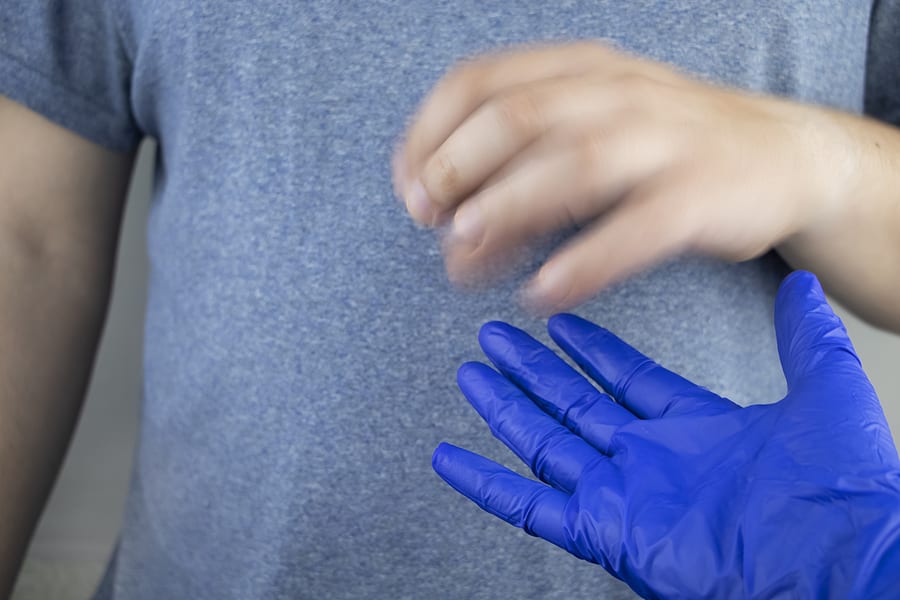Parkinson’s Disease is a progressive nervous system disorder that affects movement. It is a disease that, as of now, has no cure. This article will go over the signs, symptoms, and stages of this disease; to help inform you better. If you notice these signs in your elderly loved one, you may want to help them schedule an appointment with their physician to discuss the possibility of having Parkinson’s Disease.
Common Symptoms of Parkinson’s Disease
Above all, one of the most common symptoms of Parkinson’s disease is tremors. Shaking that usually begins in the limbs is common, even while at rest, someone suffering from this disease may have trembling hands. Another common symptom is bradykinesia, or slowed movement. Over time, even simple tasks can take much longer. The steps they take may become shorter as a part of this slowed speed.
Muscle stiffness can be quite common among most elderly individuals, but especially among those suffering from Parkinson’s. This stiffness can severely limit their range of motion and can be quite painful. Part of this muscle stiffness can include a “masked face.” This means that your loved one may have limited control over their facial muscles, including those that control drinking. In many cases, this can make your loved one look constantly mad, sad, or serious. If their face is seemingly stuck in a certain way, it could be a red flag.
Automatic motions can be limited by Parkinson’s. Automatic movements are those done unconsciously. This can include blinking, smiling, swallowing, or moving your arms as you walk.
Additional Symptoms
There are more symptoms that are associated with Parkinson’s, that may not be direct indicators of having the disease. These can include a number of issues commonly found in elderly individuals, so they may not be warning signs of the disease. However, they can still be factors that should be noted. These symptoms include constipation, insomnia, loss of smell, poor balance, and impaired posture.
Dizziness and fainting can also be a sign of Parkinson’s Disease. Low blood pressure can also cause dizziness, but it is also linked to the disease. Changes in your loved one’s voice can also be an indicator. If their voice is progressively getting more hoarse, soft, or low, it may be a sign.
Causes of Parkinson’s Disease
Genetics
While there is no known cause of the disease, there are a number of factors that can contribute to its development. Genetically, researchers have found specific mutations that can cause the disease. However, this is usually rare and is generally only seen in families with a high number of family members affected by the disease. Some genes may raise the risk of developing the disease. However, the risk factor here is considerably low.
Lewy Bodies
Lewy bodies may also be an important cause of the disease. Basically, lewy bodies are microscopic clumps of substances. They are found within the brain and can be a microscopic marker of this disease. A major issue with Lewy bodies includes a protein called a-synuclein. It is clumped in a manner that is difficult for cells to break down. Many researchers believe that this can be an important factor in further learning about the disease.
Other Risk Factors of Parkinson’s Disease
There are a number of risk factors that can contribute to the development of the disease. Age is a common factor, as most people develop the disease after the age of 60. Parkinson’s disease is also more common in men than in women.
Some environmental factors may contribute to Parkinson’s development, including exposure to certain toxins. This is more commonly seen with those exposed to herbicides and pesticides.
Parkinson’s Care At Home
If your loved one is suffering from Parkinson’s Disease, they may struggle to do basic activities around the home. Thankfully, Safe Harbor Healthcare Services has an experienced and trained staff of home health aides and nurses. We understand the difficulties that your loved one may be experiencing and can provide them with an aide that is fully prepared Your loved one’s aide can assist them in day to day tasks, including light housekeeping and cooking. Additionally, their aide can travel with them to doctor’s appointments.
Safe Harbor Healthcare Services does not provide medical or healthcare advice via articles. This material has been prepared for informational purposes only, and is not intended to provide, and should not be relied on for medical advice.
Safe Harbor Healthcare Services has been providing excellent home care on Staten Island since 1967. Our services help the elderly and disabled live safely and independently; while giving their families the peace of mind they need. For more information, contact Safe Harbor by clicking here, or call us at (718)-979-6900.

